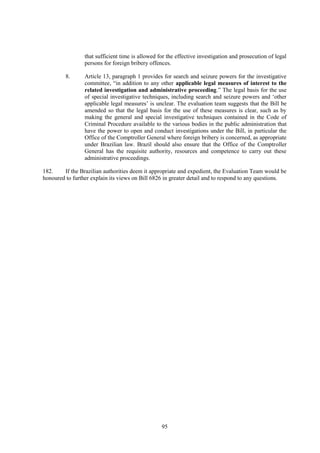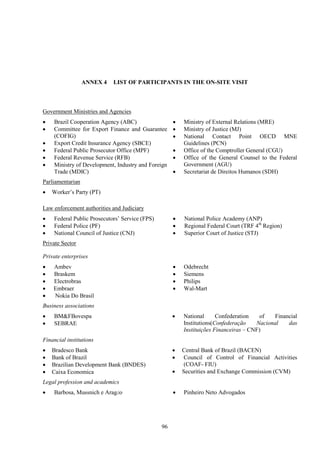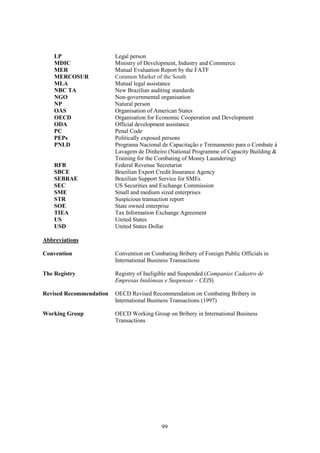Brazil is one of the largest economies in the OECD Working Group on Bribery. This Phase 3 report evaluates Brazil's implementation of the OECD Anti-Bribery Convention and related legal instruments. It finds that while Brazil has made some improvements, such as enacting a new corporate liability law, enforcement of foreign bribery remains low. The report makes recommendations to strengthen Brazil's proactivity, sanctions, protection of whistleblowers, and other areas in order to more effectively prevent and prosecute foreign bribery cases.
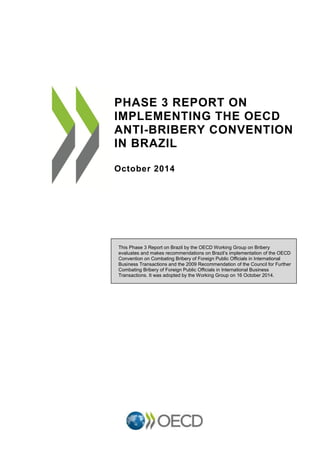

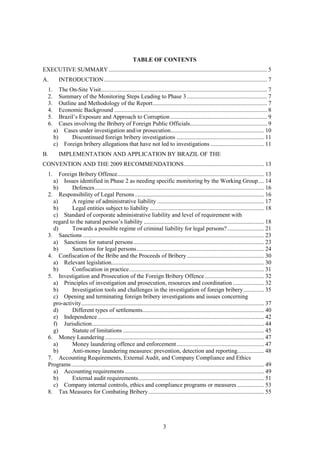

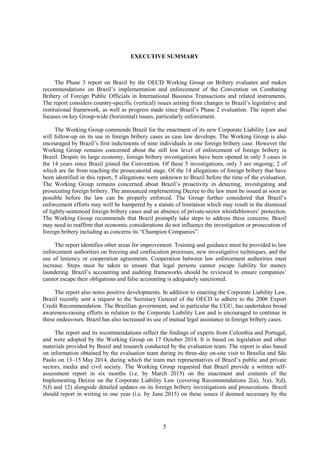
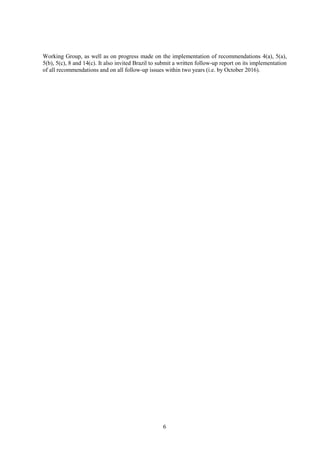

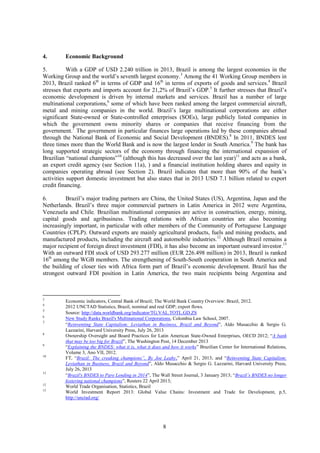

![10
a) Cases under investigation and/or prosecution
Case #1 – Aircraft Manufacturer Case: In 2007, a former director of the armed forces of a Central
American country (Country D) allegedly received payments of USD 3.4 million to secure the purchase
of aircrafts from a Brazilian company (Company A). The payments were allegedly made via three
shell companies. Brazil confirmed that the operation (worth USD 93.6 million) was financed by
BNDES which had provided “an export credit grant in the context of the purchase of [Company
A’s] aircraft”. In 2011, Company A disclosed that it was under investigation in the US. In 2012, the
Brazilian authorities tried to obtain information to establish territorial jurisdiction. A mutual legal
assistance (MLA) request was sent to the US in March 2013. Current and former executives of
Company A were interviewed and confirmed that irregular payments had been made. An investigation
was reportedly opened in 2011 in Country D. Brazil reports that it sent an MLA request to the
authorities in Country D in 2009 but has not received a response. In August 2014, indictments were
laid against nine defendants in this case; eight held managerial positions in Company A while the
ninth defendant was an intermediary hired by Company A.
Case #2 – Gas Pipeline Case: In 2005, a Brazilian company (Company B) allegedly paid commissions
of up to USD 34 million via a shell company to officials from the Ministry of Public Works and a gas
regulatory agency in a Latin American country which is a party to the Convention (Country A). The
commissions were paid in connection with the awarding of a USD 200 million contract relating to the
construction of the Southern portion of a gas pipeline in Country A. Company B then subcontracted
the work to three other companies. The media reported that BNDES financed up to USD 148 million
of the operation. Brazil was unable to provide details on the financing due to bank secrecy laws.
Investigations into the public officials and the individuals responsible within the subcontractors were
opened in Country A in 2007. The investigations were terminated in July 2013. After sending an MLA
request to Country A in 2008, Brazil initiated an investigation in 2011. The Federal Police
subsequently approached Company B. In 2013, Company B provided certified copies of a court ruling
from Country A which dismissed the charges of overpricing to the Brazilian Federal Police. Brazil
reported in August 2014 that the chance of an indictment in this case is slim because (i) the court
ruling from Country A stated that “the deal was not tainted by overpricing”, and (ii) Company B “has
become aware of the Brazilian investigation and is actively monitoring it through counsel”.
Case #3 – Heart Valves Case: A public official from a European Convention member (Country I)
allegedly received a total of EUR 775 000 between 1992 and 2002 in exchange for awarding a
contract for heart valves produced by a Brazilian company (Company C). Brazil sent a MLA request
to Country I in March 2009. Upon receipt of information from Country I in September 2012, the
Federal Prosecution Service (FPS) in the State of Minas Gerais started an investigation. The large
number of documents received started being translated at the end of 2013 and the FPS requested that a
police inquiry be initiated. In Country I, after being convicted at first instance in May 2008, the public
official’s case was dismissed on appeal because it was time-barred. Media have reported that two
Brazilian managers of Company C were convicted in Country I, at first instance, and received a
reduced imprisonment sentence on appeal in 2011. Brazil indicates that the Brazilian Federal Police
has not yet located the two Brazilian managers. Brazil did not specify what steps it intended to take in
respect of the Brazilian managers, given that they have already been convicted and sentenced in
Country I. At the time of the on-site visit, prosecutors stated that this case “is very old” and has
“limited prospect of success” as the alleged acts date back from 2001. This was of concern given the
unprecedented seriousness of this broadly-reported case which may have resulted in the death of up to
26 persons dues to the use of the defective heart valves. Prior to the adoption of the report, prosecutors
advised that they have obtained criminal records, information from the company registry and contact
information, and intended to pursue this case.](https://image.slidesharecdn.com/a8823268-4ecd-418d-b197-d47e58fc1a67-160608135216/85/Brazil-Phase-3-Report-EN-10-320.jpg)

![12
Allegation #2 - Diamond Mining: Between 2005 and 2010, Company B allegedly secured the
awarding of a diamond mining licence and a concession by promising to award 10% of the share
capital of the project to the relative of a very high ranking official in the same South-West African
country. This allegation has not triggered an investigation.
Allegation #3 - Coal Mining Contract: Regional officials of a neighbouring Latin American
Convention party allegedly received bribe payments exceeding USD 200 million in 2012 to exercise
their discretion in taxation and other aspects in relation to the awarding of one of the world’s largest
coal mining contracts to a Brazilian company. No investigation has been initiated. Brazil later
indicated that contact has been established with two prosecutors in the country.
Allegation #4 - Aircraft Acquisition: In 2009 a subsidiary of a SOE in a South American Convention
party (Country A) allegedly received bribe payments to secure a USD 900 million aircraft contract
from Brazilian Company A. In 2011, Company A disclosed that it was under investigation in the US
for potential bribery. An investigation is also on-going in Country A. According to Brazil, the
investigation in the US “will be or has been closed due to lack of sufficient ground for the
investigation”. Brazil later added that “there was no indication … that corruption might have taken
place” and that, for the moment, their focus was on Case #1. Brazil later advised that it was a
prosecutorial decision not to open an investigation at this stage.
Allegation #5 - Biofuel Company: Between 2007 and 2008 Company B allegedly paid bribes to high
level officials the same South-West African country as in allegations #1 and #2 to secure an agreement
to set up a new biofuel company with a national oil company. The deal allegedly involved a USD 200
million investment in a 30 000 hectare sugar cane plantation.
Allegation #6 - Irrigation Projects: In September 2008, due to credible allegations of corruption in the
project, the President of a Latin American country ordered the military to take over a hydroelectric
plant and four other projects managed by Brazilian Company B. The President also ordered the
opening of an investigation into loans from BNDES which had funded the operation.
Allegation #7 - Aircrafts Acquisition: In the wake of an ongoing investigation into bribe payments
made to officials in a European Convention country (Country G) by several major European arms
companies, the former Defence Ministry Deputy Director of Armaments in Country G testified in
court that he had received a EUR 250 000 commission from Brazilian Company A in 2001 to grant
contracts to the company. Upon being informed of this allegation, Brazil noted that the offending
occurred prior to the enactment of Brazil’s foreign bribery offence so an investigation would not be
possible.
Allegation #8 - Acquisition of Mining Licenses: A company owned by an Israeli businessman
(Company D) allegedly paid a total of USD 12 million in bribes to officials in a West African country
(Country G), including to a prominent official and his close relatives. The bribes were allegedly paid
in 2008 to obtain one of the biggest mining concessions in Country G. In 2010, a Brazilian Company
(Company E) acquired 51% of the mining concession (for an amount of USD 2.5 billion) and created a
joint venture with Company D. In April 2014, a government inquiry by Country G concluded that
Company D had obtained the mining concessions through corrupt practices and revoked the mining
licenses. At the same time, another mining company filed a complaint in the US against Company E,
Company D and its CEO for their active role in obtaining the mining licences to its detriment. After
being informed of the allegations, Brazil stated that an investigation was unlikely as the Brazilian
company had entered the deal two years after the alleged bribery occurred and, therefore, “the media
allegations that came to the attention of the FPS do not qualify as [a plausible allegation]” against the](https://image.slidesharecdn.com/a8823268-4ecd-418d-b197-d47e58fc1a67-160608135216/85/Brazil-Phase-3-Report-EN-12-320.jpg)
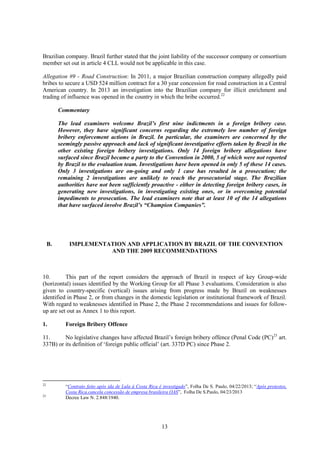
![14
a) Issues identified in Phase 2 as needing specific monitoring by the Working Group
12. In Phase 2, the Working Group concluded that Brazil’s foreign bribery offence largely
conformed to the standards of the Convention, although its scope remained untested. Consequently,
the Working Group decided to monitor certain aspects of the offence (discussed below) and the
application of Brazil’s offence of concussão (follow-up issues 7e and 7f). Seven years after the Phase
2 report, in a context where only one investigation has reached the prosecution stage, the issues
identified in Phase 2 remain. The evaluation team sought to further explore some of these issues
during the on-site visit; however, limited information was provided in some discussions. Given
Brazil’s lack of prosecutions at the time of the on-site visit, this limited the ability of the evaluation
team to explore the potential application of the offence.
(i) Intermediaries
13. Brazil’s foreign bribery offence covers bribes paid “directly or indirectly”. In Phase 2, the
Working Group questioned whether this would cover all uses of an intermediary, particularly where
the intermediary did not follow through with the offer or payment or was unaware of the principal’s
intent. In Phase 3, Brazil stated that the reference to ‘indirectly’ covers all cases of bribery through an
intermediary. Upon request of the lead examiners, Brazil provided extracts and explanations of
domestic corruption cases which indicated that domestic bribes can be paid through intermediaries,
including where the intermediary does not “willingly adhere to an ongoing crime” (i.e. is unaware of
the principal’s intent).24
In Case #1- Aircraft Manufacturer Case and Case #2 – Gas Pipeline Case the
bribes were allegedly paid through intermediary shell companies. An indictment has been returned
against the intermediary in Case #1 – Aircraft Manufacturer Case.
(ii) Acts outside the official’s authorised competence
14. Brazil’s foreign bribery offence applies to bribes paid or offered in order that the official
undertake, omit, or delay “any official act”. In Phase 2, the Working Group noted that it is not clear
whether acts outside the official’s authorised competence would be covered. At that time, Brazil
explained that the foreign bribery offence applies where the act or omission related, even indirectly, to
the functions of the official, even if the act itself is outside the official’s authority.25
Brazil’s position
on this point was inconsistent throughout the Phase 3 evaluation. Initially, Brazil acknowledged that
“the reference to an official act might not cover the act of a foreign public official if he/she is not
within his/her authorised competence”. Nonetheless, Brazil considered that the courts would read the
offence consistently with the Convention because the Convention has force of law in Brazil as
supported by case law. Moreover, during the on-site visit a senior Judge confirmed that Article 1 of
the Convention is not binding on the courts when they interpret Brazil’s foreign bribery offence.
Following the on-site visit, Brazil changed its position and stated that “the [foreign bribery] offence
will be committed if the act bears any relationships, even indirectly, with the function of the public
official”. Upon request of the lead examiners, Brazil provided one case which concerned domestic
solicitation of a bribe (an offence which, notably, makes an explicit reference to acts “outside the
function” of the official) in which the Court found that the offence could not apply where the act was
outside the scope of the official’s authority. 26
This case supports Brazil’s initial view that the foreign
bribery offence may not apply where the act is outside the official’s authorised competence.
24
Article 333 PC criminalises the “offer or promise of an undue advantage”. The cases referred to by Brazil were:
RT 542/323; Habeas Corpus 11011; Habeas Corpus 33535/SC; Criminal Action 685-DF; Criminal Action
470/MG; Habeas Corpus 33,535-SC.
25
Phase 2 Report, paragraph 142.
26
Habeas Corpus Action 200900812577.](https://image.slidesharecdn.com/a8823268-4ecd-418d-b197-d47e58fc1a67-160608135216/85/Brazil-Phase-3-Report-EN-14-320.jpg)


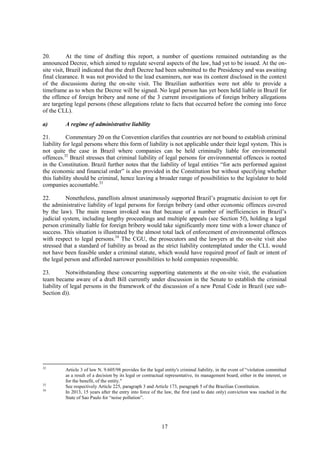
![18
b) Legal entities subject to liability
24. Determining whether SOEs can be held liable under the CLL both in law and in practice is
all the more important in an economy like Brazil’s where many SOEs are extremely large and
dominant, both within Brazil and abroad,35
and have long been considered instrumental to the
country’s economic growth.36
The legal entities subject to liability under the CLL are defined under
article 1 of the law which does not expressly cover SOEs. Nevertheless, the Brazilian authorities
affirm that SOEs, either fully or partially owned, are liable under the CCL. They are ruled by the same
laws as private sector companies under the Brazilian Law of Corporations (as provided under the
Brazilian Constitution) and they would need to be expressly excluded from the scope of the law to
escape liability. Prosecutors, judges, lawyers and compliance professionals at the on-site visit
unanimously supported the view that SOEs are covered by the CLL. However, the Brazilian
authorities conceded that there are specificities inherent to such entities that will require “some form
of adaptation/adjustment” regarding the imposition of certain sanctions, such as prohibition to receive
incentives, subsidies, grants, donations or loans from public agencies or to entities or from public
financial institutions or government controlled entities (see Section 3).
25. Beyond its role in a number of SOEs, the Brazilian Government is also very active in the
financing of private companies through BNDES,37
including several of the most important publicly
listed companies, which participants in the on-site visit called Brazil’s “Champion Companies”.38
These publicly listed companies are legally covered under the CLL.
c) Standard of corporate administrative liability and level of requirement with regard to the
natural person’s liability
(i) Legal basis for corporate administrative/civil liability
26. The CLL provides for a strict civil and administrative liability regime for legal persons and
thus does not require proof of intent of the company nor of its directors or employees. It covers a
number of wrongful acts, including foreign bribery.39
The liability of legal persons for foreign bribery
results from the combination of a number of provisions in the CLL, which together provide that: Legal
entities are strictly liable for “wrongful acts” “to the detriment of […] foreign public assets, of public
administration principles, or to Brazil’s international commitments.” performed “in [the legal
person’s] interest or for their benefit”.40
Wrongful acts are specifically listed under article 5 and
include the offer, promise or giving of an “undue advantage” to a “public official”, which according to
the Brazilian authorities, encompasses a “foreign public official”.
35
See “Ownership Oversight and Board Practices for Latin American State-Owned” prepared for the Enterprises
OECD/CAF Latin American Network on State Owned Enterprises 2012. The main SOEs in Brazil are federal,
and operating in the oil, energy, communication and financial/bank sectors, e.g. Petrobras, Electrobras, BNDES
(Brazilian Development Bank), Caixa Economica Federal and Banco de Brazil.
36
“State-owned enterprises in Brazil: history and lessons”, by Aldo Musacchio and Sergio G. Lazzarini, Workshop
on State-Owned Enterprises in the Development Process, Paris, 4 April 2014,
37
BNDES provides loans to over 200 publicly listed corporations, see Ibid.
38
FT, “Brazil: The creaking champions”, By Joe Leahy,” April 21, 2013
39
The main provision is enshrined in article 2 of the law which provides that: “Legal entities shall be held strictly
liable, in the administrative and civil spheres, for any of the wrongful acts established in this Law performed in
their interest or for their benefit, exclusive or not.”
40
Article 2, article 5, introductory para., article 5,I and article 5,V. para.1 and para. 3 CLL.](https://image.slidesharecdn.com/a8823268-4ecd-418d-b197-d47e58fc1a67-160608135216/85/Brazil-Phase-3-Report-EN-18-320.jpg)
![19
- Requirement of a “wrongful act”
27. There is a concern that the definition of the wrongful acts covered is unclear as far as foreign
bribery is concerned. Hence, the definition of the act of foreign bribery here again results from the
combination of a number of articles and includes a number of uncertainties as different articles in the
law use different terminology. Brazil stresses that under article 28 of the CLL the law “applies to
wrongful acts committed by Brazilian legal entities against foreign public administration, even if such
acts were committed overseas”.
28. Article 2 refers to “wrongful acts established in this law”; article 5, in its introductory
paragraph, defines wrongful acts as “acts to the detriment of […] foreign public assets or of public
administration, of public administration principles or to Brazil’s international commitments”; and
article 5.I. starts the list of “wrongful acts” with “to promise, offer or give, directly or indirectly, an
undue advantage to a public official or to a third party related to him/her.” Neither the “foreign”
element (“public officials” in general are targeted in this provision) or the purpose of the “undue
advantage” are included in the definition of this wrongful act itself; instead the reader must refer back
to the above quoted introductory paragraph. At the on-site visit, CGU representatives and prosecutors
contended that the mere fact that a bribe was paid to a foreign official would be sufficient to
characterise the undue advantage, as is the case in the domestic arena for natural persons. No damage
would need to be further evidenced. However, no supporting case-law or other textual reference was
provided to the evaluation team to support this assertion.
29. Brazil asserts that the lack of reference to the PC ensures the independence of the
administrative, civil and criminal spheres and that had the new law made express reference to crimes
of the PC, the procedures in civil and administrative spheres would have to await the final judgment of
criminal actions. However, the issue is not whether the different procedures are linked, but rather
whether there is a definition in line with Article 1 of the Convention for both the criminal offence in
the criminal sphere and the “wrongful act” in the civil and administrative sphere.
- Coverage of an “undue advantage”
30. The coverage of an “undue advantage” under article 5.I. CLL is similarly unclear. As to
whether this covers “any undue pecuniary or other advantage”, Brazil indicates that, although there is
no definition in the Brazilian legislation for the term “undue advantage”, this has been interpreted in
the context of domestic corruption as any incentive or advantage, pecuniary or not, received by the
public agent from private agents, either to perform activities that go beyond his/her legal attributes, or
to perform activities within his/her duties.
- Definition/coverage of a foreign public official under the CLL
31. None of the articles which, when combined, appear to establish the liability of a legal person
for foreign bribery refer to a “foreign public official”. These rather refer to “national or foreign public
administration”. Although it is not used anywhere else in the law,41
the term “foreign public official”
is defined under article 5.V. para. 3 CLL. The term “public official” is not defined in the CLL, nor is it
clear that it would cover foreign public officials or vice versa. It is only through the indirect reference
to acts performed “to the detriment of foreign public assets […] or to Brazil’s international
commitments” (article 5, introductory paragraph) that foreign public officials may be covered but a
link appears to be missing in the law.
41
Article 5.I. only refers to the offering, promising or giving of a bribe to a “public official”.](https://image.slidesharecdn.com/a8823268-4ecd-418d-b197-d47e58fc1a67-160608135216/85/Brazil-Phase-3-Report-EN-19-320.jpg)
![20
32. Regarding the scope of the definition of a “foreign public official” under article 5.V. para. 3,
Brazil indicates that there is no doubt that the phrase in Portuguese used in the CLL to define foreign
public agents, i.e “quem, ainda que transitoriamente ou sem remuneração, exerça cargo, emprego ou
função pública” covers whoever holds a judicial, legislative or executive office at all levels of the
Federal Government, regional or local.
- Definition of a foreign public administration
33. The term “foreign public administration” is also not used under article 5.I. CLL. It is here
again only through the indirect reference of acts performed “to the detriment of foreign public assets
[…] or to Brazil’s international commitments” that foreign public administrations may indirectly be
covered. This raised no doubts amongst panellists at the on-site visit. Like “foreign public officials”,
the term “foreign public administration” is defined under article 5. para. 1 and article 28 CLL as
encompassing public enterprises even when indirectly controlled by the government.42
This definition
appears to ensure a broad coverage, in line with Article 1.4. of the Convention and Commentary 14.
- Requirement that the “wrongful act” be performed “in the interest or for the benefit” of the
legal person
34. Brazil contends that "in [the legal persons’] interest or for their benefit, exclusive or not"
refers to any type of advantage resulting from the performance of the wrongful act. Brazil emphasises
that the concepts of "interest” and “benefit" are to be understood “in a broad manner” and do not
require evidence of profit, but rather “any kind of advantage” or interest. CGU panellists contended
that furthering the “interest” and the “benefit” of the legal person could cover situations where, for
instance, a legal person bribes on behalf of a related legal person (including a subsidiary, holding
company, or member of the same industrial structure) and that it would not be interpreted as a
requirement that the bribe to the foreign public official benefits the legal person that gave the bribe. In
the absence of case law or textual basis for this broad interpretation, the “interest” and “benefit”
criteria will need to be followed-up by the Working Group.
(ii) Relationship of liability between the legal person and a natural person
35. Article 3,. para 1. expressly specifies that “legal entities shall be held liable irrespective of
the individual liability of the individuals referred to in the head provision of this article.” There is no
requirement that the wrongful act be performed in the legal person’s name or through its organs and
representatives. Brazil emphasizes that the hierarchical level or even the legal ties of the individual
with the legal person are irrelevant to establish the liability of the legal entity. Proving that the acts are
committed in the “interest” or “benefit” of the legal person is sufficient to establish the connection
between the natural and the legal person and hence to establish the liability of the legal person (art. 2
CLL). The new regime thus appears to meet the requirements of the Recommendation 2009, Annex I,
Part B (a).
36. Article 3 the CLL does not exclude the individual liability of the company’s directors,
officers or any natural person participating in the harmful act. If both the individuals and the legal
person are subject to investigation (leading to prosecution on the one hand and to the administrative
procedure against legal persons on the other hand), Brazil indicates that the different procedures would
be handled in parallel. At the on-site visit, both the CGU representatives and the prosecutors
42
Brazil indicates that the criteria for determining whether a company qualifies as “indirectly controlled” by the
government are stated in the following provisions: Corporations Law N. 6.404/1976, article 243 and CVM
Instruction No. 247 of 27 March 1996.](https://image.slidesharecdn.com/a8823268-4ecd-418d-b197-d47e58fc1a67-160608135216/85/Brazil-Phase-3-Report-EN-20-320.jpg)

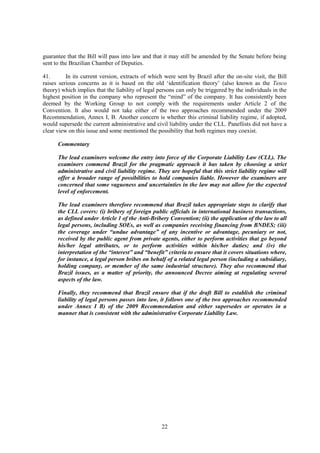


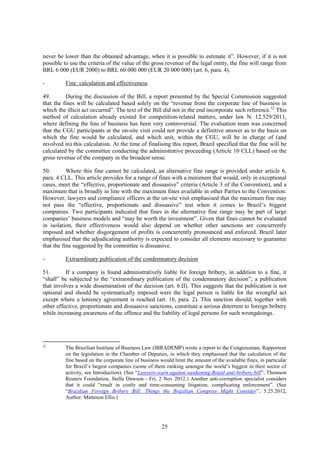





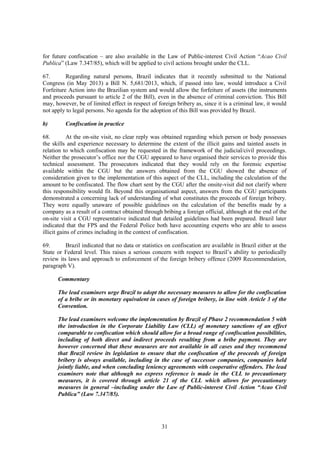
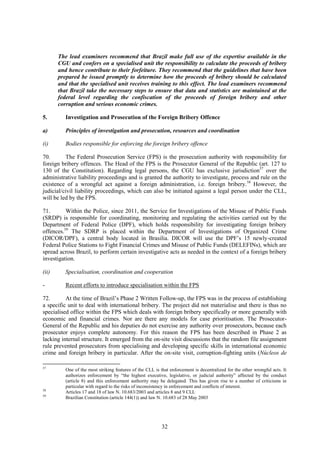

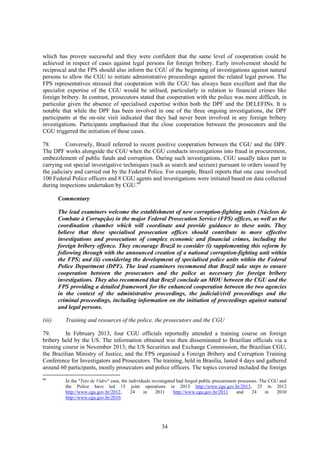

![36
techniques are not available at the detection stage, where the decision to open an investigation is to be
taken.
(ii) Access to information
82. With the newly enacted Law N. 12.830/2013 (Law 12.830 on Investigations), which
strengthens the role of the police authority, when conducting a criminal investigation, the police
authority may now directly require from any organisation any information that is not constitutionally
deemed confidential. The provision of such information shall not be denied (art 2, para. 2). The police
authority may request a judicial order to access confidential information (including financial and tax
information). Prosecutors reported that, in practice, they do not encounter difficulties in getting
approval from the courts to request such information, nor in obtaining information from banks and
financial institutions in the context of criminal investigations. Similarly, where the investigation
requires the use of investigative powers such as search and seizure or interception of
telecommunications, legal authorisation from a judge must be requested either by the police or the
prosecutors.
(iii) Investigative techniques available to the CGU in the context of the CLL
83. In administrative proceedings against a legal person for foreign bribery, the CGU - at the
request of the Committee conducting the proceeding, and “through [its] judicial representative body” -
may solicit all judicial measures necessary to investigate and process the wrongdoing, including search
and seizure (art. 10, para. 1 CLL). Representatives of the CGU and prosecutors specified that the CGU
will solicit a judicial warrant from a judge through the Attorney General’s office. It is uncertain
whether the general and special investigative techniques contained in the CCP would be available in
the context of an administrative or a judicial/civil procedure, particularly in the absence of a clear legal
basis in the CLL.
84. The CGU’s ability to compel the production of documents, emails and records in the context
of an investigation under the CLL depends on who possesses these documents. If these documents are
held by public agencies and entities, all documents required by CGU must be produced. However, in
the case of sensitive data held by private companies, CGU needs to seek a judicial warrant, like any
other law enforcement agency in Brazil. This would apply to the request to compel accounting books
and records, which may be a key element in foreign bribery investigations.
Commentary
The lead examiners recommend that Brazil encourage law enforcement authorities to make
full use of the broad range of investigative measures available to Brazilian investigative
authorities, including special investigative techniques and access to financial information, in
order to effectively investigate suspicions of foreign bribery.
The lead examiners recommend that Brazil ensure by any appropriate means that the use of
the general and special investigative techniques contained in the Code of Criminal Procedure
(CCP) is available in practice in the context of the administrative and civil proceedings under
the CLL.](https://image.slidesharecdn.com/a8823268-4ecd-418d-b197-d47e58fc1a67-160608135216/85/Brazil-Phase-3-Report-EN-36-320.jpg)
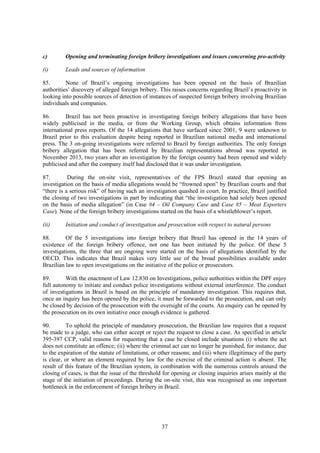
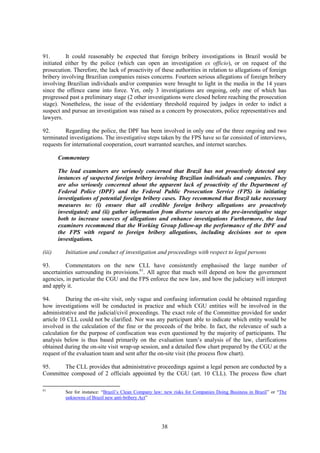

![40
98. The above description shows the complexity of the process; there are at least seven units
within the CGU involved in the administrative proceeding,62
and that does not include the potential
involvement of other entities (arts. 18-21 CLL). Brazil, however, emphasises that a similar process
exists under the Public Procurement Law (law 8,666/93) and has proven effective with 40 sanctions
against 38 companies decided by the CGU since the entry into force of the law.
99. Appeals are not contemplated under the CLL but CGU representatives clarified that,
regarding the administrative proceedings, an appeal could be made to the Minister for reconsideration
of his decision. An appeal for a judicial review of the decision could also be lodged as for all
administrative decisions. Any final decision of the CGU Minister is also potentially subject to the
oversight of the FPS - and thus control of the court - insofar as article 20 CLL provides that the
administrative sanctions (art. 6 CLL) may also be applied in a lawsuit in case of “omission of the
competent authority”, i.e. the CGU in case of foreign bribery.
Commentary
The lead examiners recommend that Brazil ensures that sufficient resources and specific
skills are available within the CGU to investigate foreign operations carried out by Brazilian
companies which may involve foreign bribery. The lead examiners recommend that the
Working Group follow-up on whether the complexity of the administrative proceedings and
the number of actors potentially involved may constitute an obstacle to the establishment of
the liability of legal entities.
d) Different types of settlements
(i) Cooperation agreements and judicial pardon for natural persons
100. As discussed in Section 3, Brazil recently enacted law N. 12.850/2013 (the Organised Crime
(‘OC’) Law) which creates the ability for natural persons to enter into a cooperation agreement or be
granted a judicial pardon. These measures are available only where the accused has “cooperated
effectively and voluntarily with the investigation” (art. 4). A cooperation agreement will be concluded
between the FPS and the accused and, if the agreement is reached during the investigative stage, the
Police Commissioner in charge of the investigation and the FPS. The agreement is then submitted to a
judge for review and approval. These agreements can be reached both before and after conviction and
can result in a reduction in sentence by up to two thirds before conviction, and by up to one half after
conviction (art. 4, intro and art. 4, para. 5). The effect of such agreements on the sanctions for foreign
bribery is further discussed under Section 3. Under the OC Law, the prosecutor and the Police
Commissioner can request the judge to grant judicial pardon for extraordinarily cooperative
defendants (art. 4, para. 2).
101. In accordance with the OC Law, “after criminal charges are accepted, the cooperation
agreement will no longer remain confidential” (art. 7, para. 3). According to Brazil, this does not mean
that cooperation agreements are publicised, it means that the other parties to the proceedings are
“entitled to be made aware of [the agreement’s] existence”. Brazil explained that under current
Supreme Court case law, it is likely that the contents of the agreement would remain confidential. In
addition, under the OC Law the accused’s “name, qualification, image and other personal information”
will be kept confidential (art. 5). The OC law remains new and fairly untested; as a result its
62
The Minister’s office, the Committee, the General Coordination for the Liability of Legal Entities, the General
Coordination for Special Operations and the Legal Office, the Coordination for Integrity and the Department for
the Promotion of Integrity, International Agreements and Cooperation.](https://image.slidesharecdn.com/a8823268-4ecd-418d-b197-d47e58fc1a67-160608135216/85/Brazil-Phase-3-Report-EN-40-320.jpg)




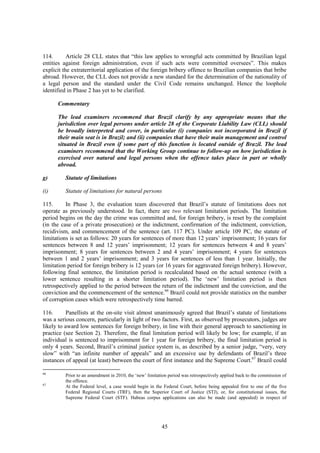





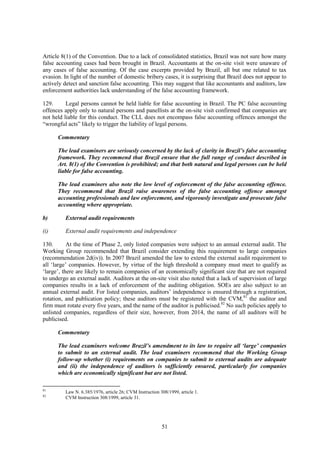
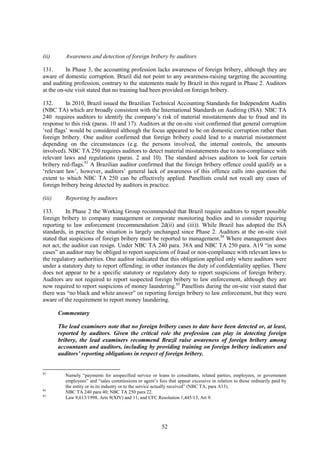
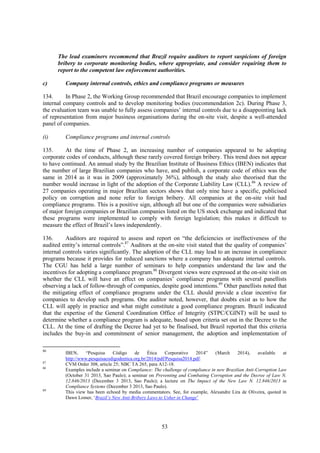
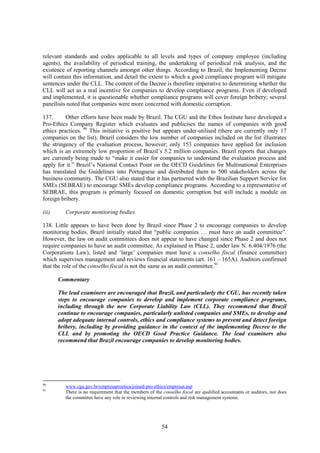

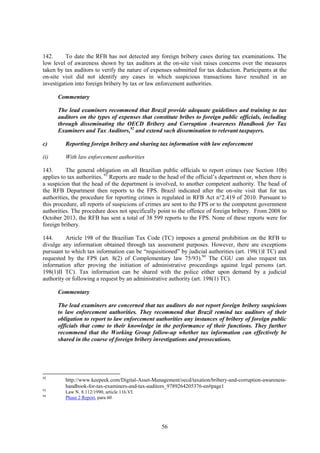
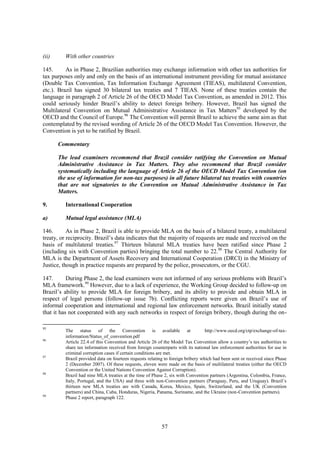
![58
site visit police representatives stated that Brazil is active in terms of regional cooperation. This
suggests that this resource may be underutilised in respect of foreign bribery.
(i) Incoming requests
148. Since Phase 2, Brazil has received 38 MLA requests relating to corruption and other
economic offences, but only three relate to foreign bribery. Statistics and consolidated information on
Brazil’s MLA requests were not provided until after the on-site visit, which prevented the evaluation
team from fully assessing this issue through discussions at the on-site visit. Several panellists
commented that Brazil’s system was much improved. All three of Brazil’s requests were received
from Convention countries. The first request was received in April 2010 and requested hearings,
searches and bank information. The second request was a request for oral testimony and was received
in July 2013. The third request was for documents and information and was received in April 2014.
Brazil reported that its average response time for most MLA requests is 8-10 months, but where the
request relates to bank secrecy or asset restraint or confiscation, the timeframe for response may be
“substantially enlarged”. Only one of the three foreign bribery related requests had been partially
fulfilled at the time of writing this report. The request received in 2010 was for bank information and,
more than four years later, has only been partially fulfilled.
149. Article 9(3) of the Convention prohibits parties from declining MLA on the basis of bank
secrecy. Bank secrecy is a constitutional guarantee in Brazil,100
but can be overridden by a court
order.101
Contrary to Brazil’s experience and earlier statements on the amount of time taken to provide
MLA on bank information, prosecutors at the onsite visit stated that orders to lift bank secrecy can
generally be obtained quickly and easily. One prosecutor stated that BNDES was particularly strict
when it came to bank secrecy. This view is substantiated by recent reports of the Bank declining
“requests by prosecutors and lawmakers” for bank information.102
This has led government opposition
to call for the removal of bank secrecy for development banks.103
Upon signing the Convention, Brazil
made a declaration that “mutual legal assistance may not be refused on the ground of bank secrecy, but
[Article 9(3) of the Convention] may not preclude the refusal to grant mutual legal assistance in
pursuance of other applicable legal norms, within the framework of the Brazilian legal system, and the
interpretation thereof set down by the courts.” Brazil explained that this declaration was necessary
“only to make clear that the Brazilian Constitutions requires a judicial decision to lift bank secrecy.”
This explanation accords with the lead examiners understanding of the Brazilian system, though on its
face the declaration could be interpreted more broadly.
Commentary
The lead examiners are concerned by the length of time taken to respond to MLA requests.
They recommend that the Working Group follow-up on Brazil’s ability to promptly and
effectively respond to foreign bribery-related MLA requests.
100
Brazil Federal Constitution, article 5.x. and XII; Complementary Law N. 105/2001; ROMS 10097/DF Rapporteur
Minister Vicente Leal, 6th Court, DJ: 15 May 2000.
101
Complementary Law N. 105/2001, article 1.4. Brazil reports that such an order will be granted where it is in the
public interest and a prima facie case exists.
102
Blake Schmidt, ‘Batista Collapse has Prosecutors at BNDES’s Door: Brazil Credit’, ‘Chefe do BNDES vai a
Comissào do Senado explicar negócios com Eike’; ‘Case Eike Batista põe em xeque qpoio do BNDES’
103
Blake Schmidt, ‘Batista Collapse has Prosecutors at BNDES’s Door: Brazil Credit’; ‘Chefe do BNDES vai a
Comissào do Senado explicar negócios com Eike’; “Oposição quer convocar Luciano Coutinho e instaurar "CPI
do BNDES”](https://image.slidesharecdn.com/a8823268-4ecd-418d-b197-d47e58fc1a67-160608135216/85/Brazil-Phase-3-Report-EN-58-320.jpg)

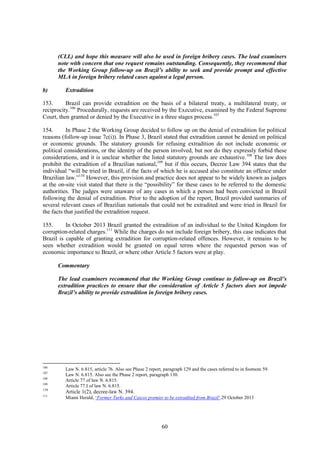

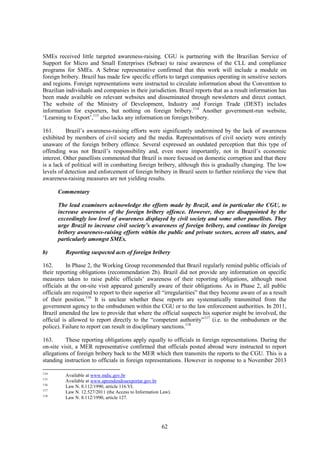

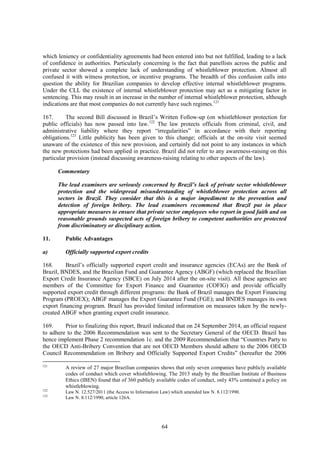

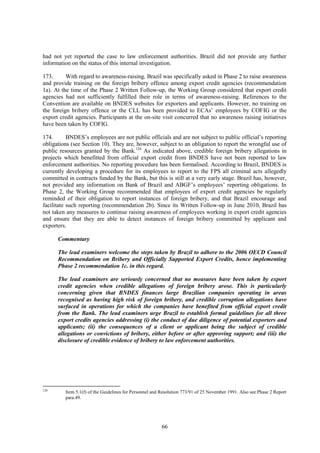

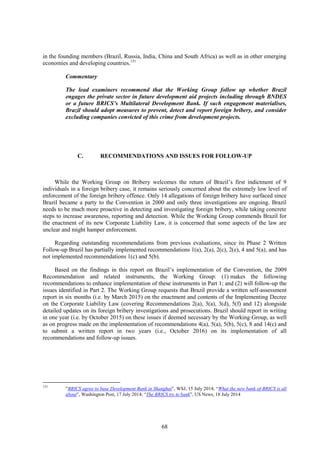
![69
1. Recommendations of the Working Group
Recommendations for ensuring effective investigation, prosecution and sanctioning of foreign
bribery
1. Regarding the foreign bribery offence, the Working Group recommends that Brazil take
all appropriate steps to clarify that the foreign bribery offence applies to bribes promised,
offered or paid, in return for acts outside of the official’s authorised competence.
[Convention, Article 1]
2. Regarding the liability of legal persons, the Working Group recommends that Brazil:
(a) Issue, as a matter of priority, the announced Decree aiming at regulating several
aspects of the Corporate Liability Law (CLL); [Convention Article 2; 2009
Recommendation III ii), V, Annex 1B]
(b) Take appropriate steps to clarify: (i) whether, in practice, the CLL covers bribery of
foreign public officials in international business transactions, as defined under
Article 1 of the Anti-Bribery Convention; (ii) the application of the law to all legal
persons, including SOEs, as well as companies receiving financing from BNDES;
(iii) the coverage under “undue advantage” of any incentive or advantage, pecuniary
or not, received by the public agent from private agents, either to perform activities
that go beyond his/her legal attributes, or to perform activities within his/her duties;
and (iv) the interpretation of the “interest” and “benefit” criteria to ensure that it
covers situations where, for instance, a legal person bribes on behalf of a related
legal person (including a subsidiary, holding company, or member of the same
industrial structure); [Convention Article 2; 2009 Recommendation III ii), V, Annex
1B]
(c) Ensure that if the draft Bill to establish the criminal liability of legal persons passes
into law, it follows one of the two approaches recommended under Annex I B) of the
2009 Recommendation and either supersedes or operates in a manner that is
consistent with the administrative CLL. [Convention Article 2; 2009
Recommendation III ii), V, Annex 1B]
3. With respect to sanctions, the Working Group recommends that Brazil:
(a) Review the CLL to clarify which sanctions are available to SOEs while ensuring that
these are effective, proportionate and dissuasive, including for the largest SOEs;
[Convention Article 3; 2009 Recommendation III (ii) and V]
(b) Re-consider including debarment as a possible administrative or civil sanction;
[Convention Article 3; 2009 Recommendation III (ii) and V]
(c) Clarify by any appropriate means that: (i) mitigating factors, although inserted in the
Chapter of the CLL that regulates administrative liability, will be taken into
consideration in determining the judicial/civil liability; and (ii) that “the offender’s
economic situation” (under article 7. VII) cannot encompass considerations
forbidden under Article 5 of the Convention, in particular with regard to SOEs but
also companies receiving financing from the State, notably through development
banks; [Convention Article 3 and Article 5; 2009 Recommendation III (ii) and V]](https://image.slidesharecdn.com/a8823268-4ecd-418d-b197-d47e58fc1a67-160608135216/85/Brazil-Phase-3-Report-EN-69-320.jpg)
![70
(d) Take the necessary steps to ensure that the Decree implementing the CLL, to be
issued by the Federal Executive Branch (i) clarifies that internal controls and
compliance programs provided under article 7.VIII can only be taken into account as
mitigating factors and cannot be used as a complete defence from liability by
companies; (ii) provides a sufficient level of detail on “the parameters of evaluation
of the mechanisms and procedures provided” to allow both the companies to
anticipate what they may be able to expect from good internal controls and
compliance and the CGU and the judiciary to make a consistent use of this
mitigating factor; and (iii) clarifies that the impact of the ethics and compliance
programs will not be limited to mitigating administrative sanctions and will also be
taken into account when determining civil sanctions; [Convention Article 3; 2009
Recommendation III (ii) and V]
(e) (i) Review the range of sanctions available for successor companies and in case of
joint liability under article 4 paragraphs 1 and 2 of the CLL with a view to providing
more flexibility and, in particular, to allow for the confiscation of the profit of
foreign bribery and the imposition of sanctions that will be better adapted to each
company’s situation; and (ii) remove the limitation of the liability of the successor
companies to the “transferred assets”. [Convention Article 3; 2009 Recommendation
III (ii) and V]
4. Regarding confiscation, the Working Group recommends that Brazil:
(a) Adopt necessary measures, including reviewing its legislation as necessary: (i) to
allow for the confiscation of a bribe or its monetary equivalent in cases of foreign
bribery; (ii) to ensure that confiscation of the proceeds of foreign bribery is always
available, including in the case of successor companies, companies held jointly
liable, and when concluding leniency agreements with cooperative offenders;
[Convention Article 3; 2009 Recommendation III (ii) and V]
(b) Make full use of the expertise available in the CGU by conferring on a specialised
unit the responsibility for calculating the proceeds of bribery; and ensure this unit is
promptly issued with the guidelines that have been prepared to determine how the
proceeds of bribery should be calculated and that the unit receives training to this
effect; [Convention Article 3; 2009 Recommendation III (ii) and V]
(c) Take the necessary steps to ensure that data and statistics are maintained at the
federal level regarding the confiscation of the proceeds of foreign bribery and other
corruption and serious economic crimes. [Convention Article 3; 2009
Recommendation III (ii) and V]
5. Regarding the investigation and prosecution of foreign bribery, the Working Group
recommends that Brazil:
(a) Ensure cooperation between the prosecutors and the police as necessary for foreign
bribery investigations and conclude an MOU between the CGU and the Federal
Prosecution Service (FPS) providing a detailed framework for the enhanced
cooperation between the two agencies in the context of the administrative
proceedings, the judicial/civil proceedings and the criminal proceedings, including
information on the initiation of proceedings against natural and legal persons;
[Convention Article 5; 2009 Recommendation XIII and Annex I D]](https://image.slidesharecdn.com/a8823268-4ecd-418d-b197-d47e58fc1a67-160608135216/85/Brazil-Phase-3-Report-EN-70-320.jpg)
![71
(b) Intensify efforts to provide guidance and regular training to the Federal Police
Department (DPF), the FPS, and the CGU on the foreign bribery offence, the CLL,
the basis and method of calculation of the proceeds of the bribe, and, as necessary,
the new investigative techniques available under the Organised Crime Law;
[Convention Article 5; 2009 Recommendation XIII and Annex I D]
(c) Ensure that sufficient resources and skills are available within the DPF, the FPS, and
the CGU in order to fight foreign bribery; and consider creating a national
corruption-fighting unit within the Federal Prosecution Service and specialised
police units within the Federal Police Department; [Convention Article 5; 2009
Recommendation XIII and Annex I D]
(d) Encourage law enforcement authorities to make full use of the broad range of
investigative measures available in foreign bribery investigations, including special
investigative techniques and access to financial information; and ensure by any
appropriate means that the use of the general and special investigative techniques
contained in the Code of Criminal Procedure is available in practice in the context of
the administrative and civil proceedings under the CLL; [Convention Article 5; 2009
Recommendation XIII and Annex I D]
(e) Take necessary measures to: (i) ensure that all credible foreign bribery allegations
are proactively investigated; and (ii) gather information from diverse sources at the
pre-investigative stage both to increase sources of allegations and enhance
investigations; [Convention Article 5; 2009 Recommendation XIII and Annex I D]
(f) Clarify in the implementing Decree to the CLL that factors forbidden under Article 5
of the Convention cannot be taken into account in the decision to initiate, conduct or
close the proceedings against a legal person. [Convention Article 5]
6. Regarding cooperation agreements and leniency agreements, the Working Group
recommends that Brazil: (i) make public, where appropriate, certain elements of leniency
and cooperation agreements concluded in foreign bribery cases, such as the reasons why
an agreement was deemed appropriate in a specific case and the terms of the arrangement;
and (ii) take all necessary measures to ensure diversion (under Law 9.099), cooperation
agreement (under the Organised Crime Law) and leniency agreements (under the CLL)
are applied consistently, including by providing training to prosecutors and issuing
guidance on the elements that may be taken into consideration in deciding whether to
enter into such agreements. [Convention Articles 3 and 5; Commentary 27; 2009
Recommendation Annex I.D]
7. Regarding jurisdiction, the Working Group recommends that Brazil clarify by any
appropriate means that the jurisdiction over legal persons under article 28 of the CLL
should be broadly interpreted and cover, in particular (i) companies not incorporated in
Brazil if their main seat is in Brazil; and (ii) companies that have their main management
and control situated in Brazil even if some part of this function is located outside of Brazil.
[Convention Article 4]
8. Regarding the statute of limitations, the Working Group recommends that Brazil (i)
urgently take steps to ensure that the statute of limitations for natural and legal persons for
foreign bribery allows adequate time for investigation, prosecution, sanctioning, and the
completion of the full judicial process, including in cases where the final sentence is at the](https://image.slidesharecdn.com/a8823268-4ecd-418d-b197-d47e58fc1a67-160608135216/85/Brazil-Phase-3-Report-EN-71-320.jpg)
![72
lower end of the scale; and (ii) clarify its ability to extend the timeframe for administrative
proceedings against legal persons. [Convention Article 6]
9. With respect to mutual legal assistance, the Working Group recommends that Brazil take
steps to ensure bank secrecy does not cause unnecessary delays in providing MLA in
foreign bribery cases. [Convention Article 9; 2009 Recommendation XIII.i]
Recommendations for ensuring effective prevention, detection and reporting of foreign bribery
10. Regarding money laundering, the Working Group recommends that Brazil:
(a) Take the necessary measures to ensure that offenders cannot escape liability when
laundering the proceeds of foreign bribery through legal persons; [Convention,
Article 7; 2009 Recommendation V]
(b) Maintain statistics on investigations, prosecutions and sanctions for money
laundering, including data on whether foreign bribery is the predicate offence;
[Convention, Article 7 and 2009 Recommendation, III (i)];
(c) Ensure that institutions and professions required to report suspicious transactions,
their supervisory authorities, as well as the Council of Control of Financial Activities
receive appropriate directives, including typologies on money laundering related to
foreign bribery and training on the identification and reporting of information that
could be linked to foreign bribery. [Convention, Article 7; 2009 Recommendation
III.i]
11. Regarding accounting and auditing, the Working Group recommends that Brazil:
(a) In regards to false accounting (i) ensure that the full range of conduct described in
Article 8(1) of the Convention is prohibited; (ii) ensure that both natural and legal
persons can be held liable for false accounting; (iii) raise awareness of the false
accounting offence among accounting professionals and law enforcement; and (iv)
ensure false accounting is vigorously investigated and prosecuted, where
appropriate; [Convention Article 8(1); 2009 Recommendation X.A.i]
(b) Raise awareness of foreign bribery among accountants and auditors, including by
providing training on foreign bribery indicators and auditors’ reporting obligations
in respect of foreign bribery; [2009 Recommendation X]
(c) Require auditors to report all suspicions of foreign bribery to corporate monitoring
bodies, where appropriate, and consider requiring them to report to the competent
law enforcement authorities. [2009 Recommendation X.B.iii and v]](https://image.slidesharecdn.com/a8823268-4ecd-418d-b197-d47e58fc1a67-160608135216/85/Brazil-Phase-3-Report-EN-72-320.jpg)
![73
12. Regarding corporate compliance, internal controls and ethics, the Working Group
recommends that Brazil continue to encourage companies, particularly unlisted companies
and SMEs, to (i) develop, and adopt adequate internal controls, ethics and compliance
systems to prevent and detect foreign bribery, including by providing guidance in the
context of the implementing Decree to the CLL and by promoting the OECD Good
Practice Guidance, and (ii) to develop monitoring bodies. [2009 Recommendation X.C.i]
13. In respect of tax measures to combat bribery of foreign public officials, the Working
Group recommends that Brazil:
(a) Take appropriate measures to ensure that the denial of tax deductibility is not
contingent on the opening of an investigation by law enforcement authorities or on
court proceedings; [2009 Recommendation III. iii, VIII; 2009 Tax Recommendation
I]
(b) Provide adequate guidelines and training on the types of expenses that constitute
bribes to foreign public officials, including through disseminating the OECD Bribery
and Corruption Awareness Handbook for Tax Examiners and Tax Auditors, and
extend such dissemination to relevant taxpayers; [2009 Recommendation VIII; 2009
Tax Recommendation I]
(c) Remind tax auditors of their obligation to report to law enforcement authorities any
instances of bribery of foreign public officials that come to their knowledge in the
performance of their functions; [2009 Recommendation III. iii, VIII; 2009 Tax
Recommendation II]
(d) Consider ratifying the Convention on Mutual Administrative Assistance in Tax
Matters and consider systematically including the language of Article 26 of the
OECD Model Tax Convention in all future bilateral tax treaties with countries that
are not signatories to the Convention on Mutual Administrative Assistance in Tax
Matters. [2009 Recommendation VIII; 2009 Tax Recommendation I].
14. With respect to awareness-raising and reporting of foreign bribery, the Working Group
recommends that Brazil:
(a) Increase civil society’s awareness of foreign bribery, and continue its foreign bribery
awareness-raising efforts within the public and private sectors, across all states, and
particularly amongst SMEs; [2009 Recommendation VIII, IX.i and ii; 2009 Tax
Recommendation II]
(b) Continue to systematically provide clear guidance to officials in foreign
representations on their reporting obligations in respect of foreign bribery and take
steps to increase detection efforts; [2009 Recommendation VIII, IX.i and ii]
(c) Regarding whistleblowing, put in place appropriate measures to ensure that private
sector employees who report in good faith and on reasonable grounds suspected acts
of foreign bribery to competent authorities are protected from discriminatory or
disciplinary action [2009 Recommendation IX.iii and Annex I.A]](https://image.slidesharecdn.com/a8823268-4ecd-418d-b197-d47e58fc1a67-160608135216/85/Brazil-Phase-3-Report-EN-73-320.jpg)
![74
15. Regarding public advantages, the Working Group recommends that Brazil:
(a) Establish formal guidelines for all three export credits agencies addressing (i) the
conduct of due diligence of potential exporters and applicants; (ii) the consequences
of a client or applicant being the subject of credible allegations or convictions of
foreign bribery, either before or after approving support; and (iii) the disclosure of
credible evidence of foreign bribery to law enforcement authorities; [2009
Recommendation XII.ii; 2006 Export Credit Recommendation]
(b) Extend its Registry of Ineligible and Suspended Companies to cover enterprises that
are determined under Brazilian law to have committed foreign bribery; [2009
Recommendation III.vii; XII.ii]
(c) Encourage public contracting authorities to consider, as appropriate, internal
controls, ethics and compliance programs in their decisions to grant public
procurement contracts. [2009 Recommendation X.C]
2. Follow-up by the Working Group
16. The Working Group will follow up on the issues below as case law and practice develops:
(a) Whether the foreign bribery offence in the Penal Code (i) covers all elements of the
definition of foreign public official; and (ii) covers all bribes offered, promised or
paid in return for acts which provide an advantage in the conduct of international
business.
(b) Brazil’s offence of concussão to ensure it cannot be used as a basis to preclude the
prosecution of a perpetrator for the offence of bribery of a foreign public official.
(c) Whether the sanctions imposed in practice for foreign bribery are effective,
proportionate and dissuasive, including with regard to (i) the use of post-sentencing
cooperation agreements; (ii) the sanctions imposed on companies which receive
financing from the State, mainly through development banks; (iii) the use of
leniency agreements under the CLL; and (ii) the application of civil sanctions and
confiscation that may result from a separate civil action.
(d) The performance of the DPF and the FPS with regard to foreign bribery allegations,
including decisions not to open investigations.
(e) Whether the complexity of the administrative proceedings and the number of actors
potentially involved may constitute an obstacle to the establishment of the liability
of legal entities.
(f) The application of judicial pardons in cases of foreign bribery, and whether they are
used appropriately.
(g) Whether the FPS exercises the control provided under article 20 of the CLL to apply
both administrative and civil sanctions in the case of omission of the CGU.
(h) How jurisdiction is exercised over natural and legal persons when the offence takes
place in part or wholly abroad.](https://image.slidesharecdn.com/a8823268-4ecd-418d-b197-d47e58fc1a67-160608135216/85/Brazil-Phase-3-Report-EN-74-320.jpg)
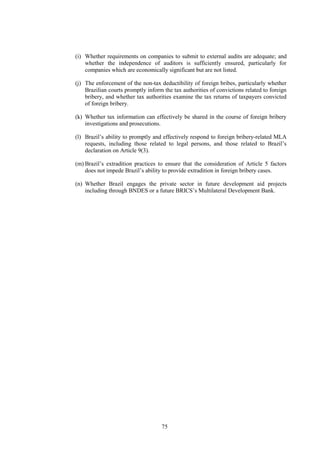

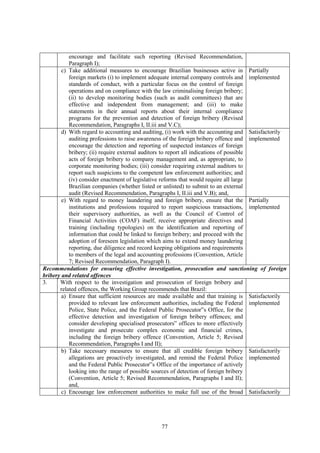

![79
ANNEX 2 LEGISLATIVE EXTRACTS
[Unofficial English translation]
CONSTITUTION: FEDERATIVE REPUBLIC OF BRAZIL 1988
Article 173
[…]
§ 5 - The law shall, without prejudice to the individual liability of the managing officers of a legal entity,
establish the liability of the latter, subjecting it to punishments compatible with its nature, for acts
performed against the economic and financial order and against the citizens' monies.
*****
DECREE LAW 2 848 OF 7 DECEMBER 1940 – PENAL CODE
Extraterritoriality
Article 7
The following are subject to Brazilian law, even if committed abroad: […]
II. the offences:
(a) that, under treaty or convention, Brazil has undertaken to control;
(b) practices by Brazilian national;
(c) Practiced in Brazilian aircraft or boats, whether commercial or private, when in foreign territory and
not tried there.
§ 1- in the case set out in clause I, the agent is punished according to Brazilian law, regardless of being
acquitted or convicted abroad.
Paragraph 2 - in the cases set out in clause II, the application of Brazilian law depends on the concurrence of the
following conditions:
(a) The offender enters Brazilian territory;
(b) The act is also punishable in the country where it was committed;
(c) The criminal offence is included among those for which Brazilian law authorizes extradition;
(d) The offender has not been tried and found not guilty abroad or has not served the sentence there;
(e) The offender has not been pardoned abroad or, for any other reason, the sentence has not been
eliminated, pursuant to the most favorable law.
Sanctions
Article 49
The pecuniary sentence consists in the payment to the penitentiary fund of an amount determined in the sentence
and calculated in daily fine. It shall be at least 10 (ten) and at the most 360 (three hundred and sixty) daily fine.
(Provision set forth by the Law 7 209 of 11 November 1984)
§ 1 – the amount of the daily fine shall be determined by the judge and cannot be lower than one-thirtieth of the
highest monthly minimum salary ruling at the time of the commission of the crime, nor higher than 5
(five) times this salary. (Provision set forth by the Law 7 209 of 11 November 1984)](https://image.slidesharecdn.com/a8823268-4ecd-418d-b197-d47e58fc1a67-160608135216/85/Brazil-Phase-3-Report-EN-79-320.jpg)
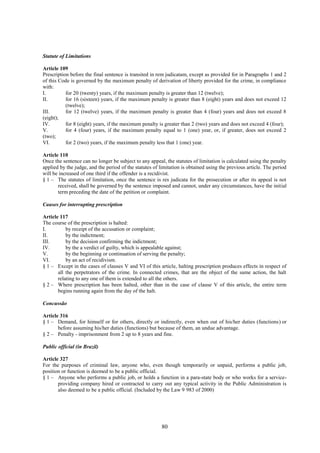

![82
In response, the defendant can argue preliminaries and claim all that interest to his defence; offer documents and
justifications; specify the required evidence and call witnesses; and call witnesses by requesting a subpoena
when needed. (Included by Law No. 11,719, 2008).
§ 1 - An exception will be processed in separate, under arts. 95-112 of this Code. (Included by Law No.
11,719, 2008).
§ 2 - If no answer is submitted within the statutory period, or if the accused does not cite a defender, the judge
shall appoint counsel to offer it, allowing him to examine the records for 10 (ten) days. (Included by Law
No. 11,719, 2008)
Art. 397
After compliance with the provisions of art. 396-A, and subparagraphs, of this Code, the judge should summarily
acquit the accused based on: (6.30.1995 by Law no. 11,719, 2008).
I. the clear existence of a cause notwithstanding the illegality of the facts; (Included by Law no. 11,719,
2008).
II. the clear existence of a cause notwithstanding the guilt of the offender except where not attributable;
(Included by Law no. 11,719, 2008).
III. the fact narrated obviously does not constitute a criminal offense; or (Included by Law no. 11,719,
2008).
IV. the punishment of the offender has become extinct. (Included by Law no. 11,719, 2008).
*****
LAW 12,850 OF 2 AUGUST 2013 - ORGANISED CRIME
Article 1
[…]
§ 2 – This Law shall also apply to:
I criminal offenses provided for in international treaties or conventions, when such actions originate in the
country and the criminal result occurs or should have occurred abroad, or vice versa;
Means for obtaining evidence
Article 3
At any stage of the criminal prosecution, without prejudice to other means already established by law, the
following means of obtaining evidence are allowed:
I conclusion of plea agreements;
II monitoring of electromagnetic, acoustic or optical signals;
III controlled response;
IV access to phone and computer records, data contained in public or private databases and commercial and
electoral information;
V interception of telephone and computer communications, according to the terms established in specific
legislation;
VI waiver of right to financial, banking and tax secrecy, according to the terms established in specific
legislation;
VII infiltration of police officers during the course of an investigation, as established in Article 11;
VIII cooperation among federal, district, state and municipal government institutions for the purpose of
obtaining evidence and information relevant to the investigation or finding of facts.](https://image.slidesharecdn.com/a8823268-4ecd-418d-b197-d47e58fc1a67-160608135216/85/Brazil-Phase-3-Report-EN-82-320.jpg)
![83
Plea agreements
Article 4
A judge may, at the request of the parties, grant judicial pardon to, or reduce by up to 2/3 (two-thirds) or replace
with a sentence of restrictive rights the custodial sentence of those who have cooperated effectively and
voluntarily with the investigation and criminal prosecution, provided that such cooperation produced one or
more of the following results:
I identification of joint principals and accessories that integrate a criminal organization and of the criminal
offenses committed by them;
II the disclosure of the hierarchical structure and the division of tasks within a criminal organization;
III prevention of criminal offenses arising from the activities performed by a criminal organization;
IV full or partial recovery of the products or proceeds derived from criminal offenses committed by a
criminal organization;
V location of any victims of a criminal organization provided their physical integrity is preserved.
Paragraph 1 - in any case, the granting of this benefit shall take into account the personality of the collaborator of
Justice, the nature, circumstances, severity and social impact of the criminal offense and the effectiveness of the
collaboration.
Paragraph 2 - depending on the relevance of the collaboration, the Prosecution Office, at any time, and the chief
of police, in the records of the police investigation with the manifestation of the Prosecution Office, both may
require or ask the judge to grant judicial pardon to the collaborator of Justice, even if such benefit has not been
provided for in the initial proposition, subject to the provisions established in Article 28 of Decree Law n. 3,689,
of October 3, 1941 (Code of Criminal Procedure) where applicable.
Paragraph 3 - the timeframe to file criminal charges against the collaborator of Justice or to file an action against
him/her may be suspended for up to 6 (six) months, and extended for equal period of time, during which the
statute of limitations is also suspended, until the cooperation measures are fulfilled.
Paragraph 4 - in the event of the circumstances referred to in the head provision of this Article, the Prosecution
Office may refrain from filing criminal charges against the collaborator of Justice if he or she: […]
II is the first person to effectively collaborate with investigations pursuant to the terms and conditions
established in this Article.
Paragraph 5 - in the event of collaboration rendered after the entering of a judgment, the penalty may be reduced
by half or the system of imprisonment may be changed even if the objective requirements have not been met.
[…]
Article 5
The collaborator of Justice is granted the right to:
I benefit from protection measures provided for in specific legislation;
II keep his/her name, qualification, image and other personal information preserved;
III be individually taken to court, separated from other joint principals and accessories;
IV attend hearings without keeping visual contact with other criminal defendants;
V keep his/her identity undisclosed to the media and refuse to be photographed or filmed without prior
written consent;
VI serve the sentence in a correctional facility that has not been designated to other joint defendants or
convicted offenders.
*****
LAW 12 846 OF 1 AUGUST 2013 - ADMINISTRATIVE LIABILITY OF LEGAL PERSONS
(CORPORATE LIABILITY LAW)
CHAPTER I - GENERAL PROVISIONS
Article 1
This Law provides for the strict civil and administrative liability of legal entities for acts committed against
national or foreign public administration.
Sole paragraph - the provisions set forth in this Law shall apply to companies and general partnerships, either
incorporated or not, regardless of their business organization or corporate model, as well as to foundations,](https://image.slidesharecdn.com/a8823268-4ecd-418d-b197-d47e58fc1a67-160608135216/85/Brazil-Phase-3-Report-EN-83-320.jpg)



![87
Article 15
After the administrative proceeding is completed, the committee appointed to determine the liability of the legal
entity shall give notice of its existence to the Public Prosecution Office in order for it to proceed with the
investigation of possible offenses.
CHAPTER V - LENIENCY AGREEMENT
Article 16
The highest authority of each public body or entity may enter into a leniency agreements with the legal entity
liable for the performance of the acts provided for in this Law that effectively collaborate with the investigations
and with the administrative proceeding provided that such collaboration results in:
I the identification of the ones involved in the offense, whenever applicable; and
II rapidly obtaining information and documents that prove the wrongful acts under investigation.
Paragraph 1 - the agreement referred to in the head provision of this Article may only be executed if the
requirements listed below are fulfilled cumulatively:
I the legal entity is the first one to come forward and demonstrate its willingness to cooperate with the
investigation of the wrongful act;
II the legal entity completely ceases its involvement in the investigated offense as of the date the agreement
is proposed;
III the legal entity admits its participation in the wrongful act and fully and permanently cooperates with the
investigations and administrative proceedings, always attending, at its expense and whenever requested,
to all procedural acts until the end of the case.
Paragraph 2 - the execution of the leniency agreement will exempt the legal entity from the sanctions provided
for in item II of Article 6 and in item IV of Article 19 and will reduce the amount of the applicable
fine by up to 2/3 (two-thirds).
Paragraph 3 - the leniency agreement does not exempt the legal entity from its obligation to make full restitution
for the damages caused.
Paragraph 4 - the leniency agreement will establish the necessary conditions to ensure the effectiveness of legal
entity´s collaboration and the useful result of the proceeding.
Paragraph 5 - the effects of the leniency agreement will be extended to legal entities that are part of the same
economic group, in fact or by law, provided that they jointly execute the agreement, respected the
conditions therein established.
Paragraph 6 - the proposal of the leniency agreement will only become public after the execution of the
respective agreement, except if in the best interest of the investigations and of the administrative
proceeding.
Paragraph 7 - the denial of a proposed leniency agreement will not result in the confession of the wrongful act
under investigation.
Paragraph 8 - in the event of breach of the leniency agreement, the legal entity will be prohibited from entering
into a new agreement for 3 (three) years starting on the date that the public administration becomes
aware of the said breach.
Paragraph 9 - the execution of a leniency agreement interrupts the statute of limitation of the wrongful acts
provided for in this Law.
Paragraph 10- the Office of the Comptroller General (CGU) is the competent authority to enter into leniency
agreements in the federal Executive Branch, as well as on cases of wrongful acts committed
against the foreign public administration.
[…]
CHAPTER VI - JUDICIAL LIABILITY
Article 18
The liability of the legal entity in the administrative sphere does not exclude the possibility of its liability in the
judicial sphere.
Article 19
The Federal Government, the States, the Federal District and the Municipalities, through their respective Public
Advocacy Offices or legal representation bodies, or their equivalent, and the Public Prosecution Office may file](https://image.slidesharecdn.com/a8823268-4ecd-418d-b197-d47e58fc1a67-160608135216/85/Brazil-Phase-3-Report-EN-87-320.jpg)
![88
a judicial action in relation to the wrongful acts set forth in Article 5 of this Law, with a view to the application
of the following sanctions to the responsible legal entities:
I loss of the assets, rights or valuables representing the advantage or profit directly or indirectly obtained
from the wrongdoing, except for the right of the damaged party or of third parties in good faith;
II partial suspension or interdiction of its activities;
III compulsory dissolution of the legal entity;
IV prohibition from receiving incentives, subsidies, grants, donations or loans from public agencies or
entities and from public financial institutions or government-controlled entities from 1 (one) to 5 (five)
years.
Paragraph 1 - the compulsory dissolution of the legal entity will be established when the following is evidenced:
I the corporate personality was used on a regular basis to facilitate or promote the performance of wrongful
acts; or
II the legal entity was organized to conceal or dissimulate illegal interests or the identity of the beneficiaries
of the acts performed.
[…]
Paragraph 3 - sanctions may be applied in an isolated or cumulative manner.
Paragraph 4 - the Public Prosecution Office or the judicial representative body of the public entity, or their
equivalent, may request the freezing of assets, rights or values necessary to guarantee the payment
of the fine or to ensure the full restitution for the damages caused, as provided for in Article 7,
except for the right of third parties in good faith.
Article 20
The sanctions set forth in Article 6 may be applied in the lawsuits files by the Public Prosecution Office, without
prejudice to the sanctions set forth in this Chapter, provided that an omission of the competent authority to
provide the administrative liability is verified.
[…]
CHAPTER VII - FINAL PROVISIONS
[…]
Article 25
The wrongful acts set forth in this Law are time-barred in 5 (five) years, as of the date of the awareness of the
wrongdoing or, in case of permanent or continued violation, as of the date in which it is ceased.
Sole paragraph - the statute of limitation will be interrupted, in the administrative or judicial sphere, by the
commencement of the proceeding aimed at investigating the wrongdoing.
[…]
Article 28
This Law applies to wrongful acts committed by Brazilian legal entities against foreign public administration,
even if such acts were committed overseas.
*****
COMPLEMENTARY LAW 105 OF 10 JANUARY 2001 – BANK SECRECY
Article 1
The financial institutions shall keep the confidentiality of their active and passive transactions and services
rendered. […]
Paragraph 3 - the actions listed below shall not be considered a violation of the duty of confidentiality: […]
IV the reporting of illicit activities to the competent authorities, including information on transactions that
involve funds deriving from criminal activities; […]
Paragraph 4 - the breach of confidentiality may be ordered, when it is necessary to verify the occurrence of any
illicit activity, in any stage of investigations or legal proceedings, and especially in the case of the following
crimes:
I terrorism;
II illicit trafficking in narcotic substances or similar drugs;](https://image.slidesharecdn.com/a8823268-4ecd-418d-b197-d47e58fc1a67-160608135216/85/Brazil-Phase-3-Report-EN-88-320.jpg)
![89
III smuggling or trafficking in weapons, munitions, or materials used for their production;
IV extortion through kidnapping;
V acts against the Brazilian financial system;
VI acts against the Public Administration;
VII acts against the fiscal and social security order;
VIII money laundering or concealment of assets, rights, and valuables;
IX acts committed by a criminal organization.
*****
LAW 8 112 OF 11 DECEMBER 1990 – CIVIL SERVICE
Article 116
The duties of a public official: […]
VI to inform the irregularities that they have knowledge due to its post to a higher authority or, when there is
a suspicion of involvement of such authority in the irregularity, to other competent authority able to start
an investigation.
Article 126-A
No public official shall be civil, criminal or administrative liable by informing a higher authority, or when there
is suspicion of involvement of such higher authority in the irregularity, another authority competent for the
verification of the information concerning the practice of crimes or misconduct of which it has knowledge, even
if such knowledge arises through the exercise of office, employment or public office.
*****
LAW 6 404 OF 15 DECEMBER 1976 – CORPORATIONS LAW
Article 243
The annual management report shall indicate the company's investments in its affiliates and subsidiaries and
mention changes during exercise. […]
§ 2 - a company is considered controlled when the controlling company, directly or through other subsidiaries,
owns enough partnership rights that permanently assure its predominance over corporate resolutions of
said controlled company, as well as the power to elect the majority of its directors.
Accounting requirements
Article 176
At the end of each fiscal year, the board shall prepare, based on the bookkeeping of the company, the following
financial statements, which should clearly express the situation of the company's assets and the changes which
occurred in the year:
I balance sheet
II statement of retained earnings
III statement of income
IV statement of cash flows; and (Amended by Law No. 11,638, 2007)
V if the company is a publicly held company, the value added statement. (Included by Law No. 11,638,
2007)
§ 1 The statements for each financial year will be published indicating the corresponding values of the
statements from the previous year. […]
Article 177
The Company will maintain permanent records, in compliance with the precepts of commercial law and this Act
and generally accepted accounting principles, observing uniform accounting methods or criteria in time and
recording the equity changes according to the accrual method.](https://image.slidesharecdn.com/a8823268-4ecd-418d-b197-d47e58fc1a67-160608135216/85/Brazil-Phase-3-Report-EN-89-320.jpg)
![90
*****
LAW 11 638 OF 28 DECEMBER 2007 – AMENDMENT TO LAW 6 404
Article 3
The provisions of Law No. 6404 of December 15, 1976 on bookkeeping and preparation of financial statements
and mandatory audit by an independent auditor registered with the Securities and Exchange Commission apply
to large-sized companies, even though they are not incorporated in the form of a joint stock company.
Single paragraph – for the exclusive purposes of this Law, a company or group of companies under a common
control is considered large when it has, at the previous fiscal year, assets exceeding R$ 240,000,000.00 (two
hundred forty million Reals) or annual gross revenues in excess of R $ 300,000,000.00 (three hundred million
Reals).
*****
LAW 9613 OF – MONEY LAUNDERING
Money laundering offence
Article 1
To conceal or disguise the nature, origin, location, disposition, movement, or ownership of assets, rights or
valuables, which result directly or indirectly from any criminal offense.
[…]
Penalty – incarceration for a period of 3 (three) to 10 (ten) years and a fine.
Suspicious transaction detection and reporting
Article 9
The obligations set forth in articles 10 and 11 herein shall apply to natural or legal persons who engage, on a
permanent or occasional basis, as a principal or secondary activity, cumulatively or not:
I The reception, brokerage, and investment of third parties’ funds in Brazilian or foreign currency;
II The purchase and sale of foreign currency or gold as a financial asset;
III The custody, issuance, distribution, clearing, negotiation, brokerage or management of securities;
Sole paragraph – The same obligations shall apply to the following:
I Stock, commodities and futures exchanges and organized over-the-counter market systems;
II Insurance companies, insurance brokers, and institutions involved with private pension plans or social
security;
III Payment or credit card administrators and consortia (consumer funds commonly held and managed for
the acquisition of consumer goods); […]
X. The natural or legal persons who carry out real-estate promotion activities or the sale and purchase of real
estate;
XI Individuals or legal entities that engage in the commerce of jewelry, precious stones and metals, works of
art, and antiques;
XII The natural or legal persons who trade or mediate the trading of luxury or valuable goods, or perform any
activity that involves a great amount of funds in cash; […]
XIV The natural or legal persons who provide, even occasionally, advisory, consulting, accounting, auditing,
counseling or assistance services of any nature […]
Article 10
The legal entities referred to in article 9 hereof shall:
I Identify their customers and maintain updated records in compliance with the provisions set forth by the
competent authorities;
II Keep up-to-date records of all transactions, in Brazilian and foreign currency, involving securities, bonds,
credit instruments, metals, or any asset that may be converted into cash that exceed the amount set forth](https://image.slidesharecdn.com/a8823268-4ecd-418d-b197-d47e58fc1a67-160608135216/85/Brazil-Phase-3-Report-EN-90-320.jpg)
![91
by the competent authorities, and which shall be in accordance with the instructions issued by these
authorities;
III Shall adopt policies, procedures and internal control mechanisms, compatible with their size and volume
of operations, which enable them to comply with the provisions of this article and of article 11, in the
manner of the instructions issued by the competent authorities;
IV Shall register and keep their registry updated with the competent regulatory or supervisory authority, or,
in the absence of such an authority, with the Council for Financial Activities Control (COAF);
V Shall comply with the requests made by COAF, in the frequency, manner and conditions set forth by said
Council, and said Council shall preserve the secrecy of information provided, under applicable law.
Paragraph 1 – If the customer is a legal entity, the identification mentioned in item I of this article shall include
the individuals who are legally authorized to represent it, as well as its owners.
Paragraph 2 – The records mentioned in items I and II of this article shall be kept during a minimum period of
five years, beginning on the date the account is closed or the date the transaction is concluded. However, the
competent authorities may decide, at their own discretion, to extend this period. […]
Article 11
The legal entities referred to in article 9 hereof:
I Shall pay special attention to any transaction that, in view of the provisions set forth by the competent
authorities, may represent serious indications of or be related to the crimes referred to in this law;
II Shall report to COAF, refraining from informing any person, including any to whom the information
refers, within 24 hours, the proposal or performing:
(a) of any transaction referred to in item II of article 10, including the identification referred to in item I of
the same article; and;
(b) of operations referred to in item I.
III Shall report to the competent regulatory or supervisory authority, or, in the absence of such an authority,
to the Council for Financial Activities Control (COAF), in the frequency, manner and conditions set forth
by them, the non-occurrence of the proposals, transactions or operations which are reportable under the
terms of item II.
Paragraph 1 – The competent authorities referred to in item I hereof shall establish a list of transactions that
could characterize the kind of operations mentioned herein, in regard to their basic features, the parties and
amounts involved, the implementation, the means of execution, or the lack of economic or legal grounds for
them.
Paragraph 2 – Information provided in good faith, pursuant to the provisions set forth in this article, shall not
generate any civil or administrative liability.
Paragraph 3 – COAF shall make any reports received based on item II of this article available to the competent
authorities for regulating and supervising the persons referred to in article 9.](https://image.slidesharecdn.com/a8823268-4ecd-418d-b197-d47e58fc1a67-160608135216/85/Brazil-Phase-3-Report-EN-91-320.jpg)
![92
ANNEX 3 SUBMISSION BY THE OECD EVALUATION TEAM ON
BILL 6826/2010 PROVIDING FOR THE ADMINISTRATIVE AND CIVIL LIABILITY OF
LEGAL PERSONS FOR ACTS AGAINST THE NATIONAL AND FOREIGN PUBLIC
ADMINISTRATION AND OTHER MEASURES
12 MAY 2011
Further to the stated interest of Brazil, the OECD Phase 2 Evaluation Team for Brazil –
comprised of lead examiners from Chile and Portugal, and representatives of the OECD Secretariat
– is pleased to share its views on Bill 6826/2010 providing for the administrative and civil liability of
legal persons for acts against the national and foreign public administration and other measures
(hereafter: Bill 6826).
The opinions expressed in this paper represent the views of the members of the Evaluation
Team alone, and the views and recommendations of the OECD Working Group on Bribery
(hereinafter the WGB) on Bill 6826 will not be available until the next peer review carried out by
the WGB, normally scheduled for June 2014 in the context of the Phase 3 Review of Brazil.
179. The Evaluation Team expresses its sincere appreciation for the Brazilian Government’s
efforts to bring its law into compliance with Article 2 of the OECD Anti-Bribery Convention, which
requires State Parties to establish the liability of legal persons for the bribery of foreign public
officials, and Article 3, which requires that legal persons are subject to effective, proportionate and
dissuasive sanctions for such bribery.
180. The Evaluation Team notes that the Bill was submitted to Congress a year ago, in February
2010 and that it passed the Chamber of Deputies and is currently under examination by four
specialised commissions. It understands that, given the general elections which took place in Brazil in
the third quarter of 2010, discussions and adoption of this Bill in Congress was delayed. The
Evaluation Team hopes that Congress can now promptly complete the procedure for adopting Bill
6826.
181. The Evaluation Team considers that Bill 6826 is a general improvement over the current
situation in Brazil for liability of legal persons for foreign bribery. However, the Evaluation Team has
certain reservations, and considers that the Bill could be substantially improved by addressing the
principal following elements:
1. It could be clarified that this Bill applies to all legal persons, including state-owned
and state-controlled enterprises.
2. The notion of “agent” (article 2 and article 3, paragraph 2 of the Bill) raises
questions among the Evaluation Team. Article 2 of the bill sets out ‘any agent […]
representing such legal persons’ as the trigger for administrative and civil liability
for legal persons, and article 3(2) provides that legal persons shall be held
objectively liable for illicit acts committed in their interest or for their benefit by any
‘agents’. The term ‘agent’ is not further defined in the Bill. Preliminary research by
the evaluation team indicates that article 710 of the Brazilian Civil Code, for
instance, provides that “By the agency agreement, a person assumes, on a non-
occasional basis and without an employment relationship the obligation of
promoting, on behalf of another, subject to remuneration, the conduct of certain](https://image.slidesharecdn.com/a8823268-4ecd-418d-b197-d47e58fc1a67-160608135216/85/Brazil-Phase-3-Report-EN-92-320.jpg)
![93
transactions, in a determinate zone.” The Evaluation Team is concerned that the
reference to an agent in the absence of further definition could invoke this narrow
Civil Code definition of agency agreements and may considerably restrict the
category of persons whose acts may trigger the liability of the legal person, thus
making this law not fully in compliance with the standards set by the WGB. In this
respect, the 2009 Anti-Bribery Recommendation adopted by the 38 State Parties to
the OECD Anti-Bribery Convention clearly lays out the categories of natural persons
whose acts trigger the liability if the legal person.132
3. Bill 6826 also does not define the concept of “entity representing the legal person”
(article 2 of the Bill), and this could also be clarified. For memory, the WGB
clarified in 2009 that “a legal person cannot avoid responsibility by using
intermediaries, including related legal persons, to offer promise or give a bribe to a
foreign public official on its behalf.” 133
In addition, while article 2 specifies that acts
by “an entity representing the legal person” may trigger corporate liability, article
3(2) only refers to agents. There therefore appears to be inconsistencies in the
triggering factors in each article.
4. The definition of the acts covered is unclear as far a foreign bribery is concerned.
Reference is never made to the definition of offences in article 337 et seq. of the
Brazilian Penal Code, and different articles in the bill use different terminology.
Article 1 uses the term “acts committed against the […] foreign public
administration” (“atos contra a administraçao publica […] estrangeira”), which is
the same term used in the Brazilian Penal Code (although no direct reference to the
Code is ever made). Several other articles (articles 3(2), 6(VII), 9(VII)) refer more
generally to “illicit acts”, but no definition of this term is provided in the Bill. Article
6 refers to “acts prejudicial to the (…) foreign public administration” (“atos lesivos à
administraçao (…) estrangeira”), which include “any act committed against public
(...) international property” (“que atentem contra o patrimônio public”); which seem
to imply that some sort of prejudice or damage must have been caused to the foreign
public administration or to public international property for the law to apply. This
132
For memory, in Annex I to the 2009 Recommendation on Further Combating Bribery of Foreign
Public Officials in International Business Transactions, the WGB clarified that:
Member countries’ systems for the liability of legal persons for the bribery of foreign public officials in
international business transactions should take one of the following approaches:
a. the level of authority of the person whose conduct triggers the liability of the legal person is
flexible and reflects the wide variety of decision-making systems in legal persons; or
b. the approach is functionally equivalent to the foregoing even though it is only triggered by acts of
persons with the highest level managerial authority, because the following cases are covered:
A person with the highest level managerial authority offers, promises or gives a bribe to a
foreign public official;
A person with the highest level managerial authority directs or authorises a lower level
person to offer, promise or give a bribe to a foreign public official; and
A person with the highest level managerial authority fails to prevent a lower level person from
bribing a foreign public official, including through a failure to supervise him or her or
through a failure to implement adequate internal controls, ethics and compliance programmes
or measures.
133
See the 2009 Recommendation on Further Combating Bribery of Foreign Public Officials in
International Business Transactions, Annex I, paragraph C.](https://image.slidesharecdn.com/a8823268-4ecd-418d-b197-d47e58fc1a67-160608135216/85/Brazil-Phase-3-Report-EN-93-320.jpg)

